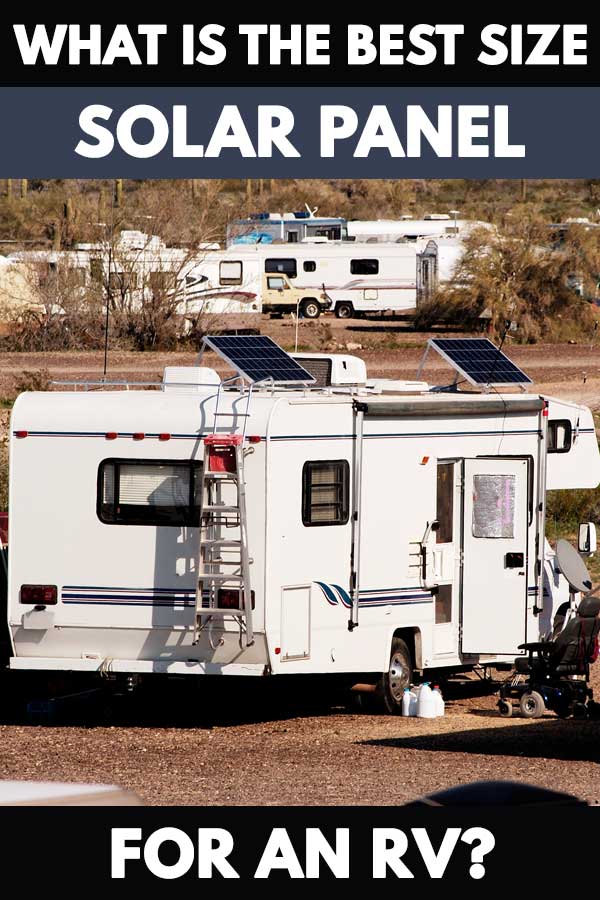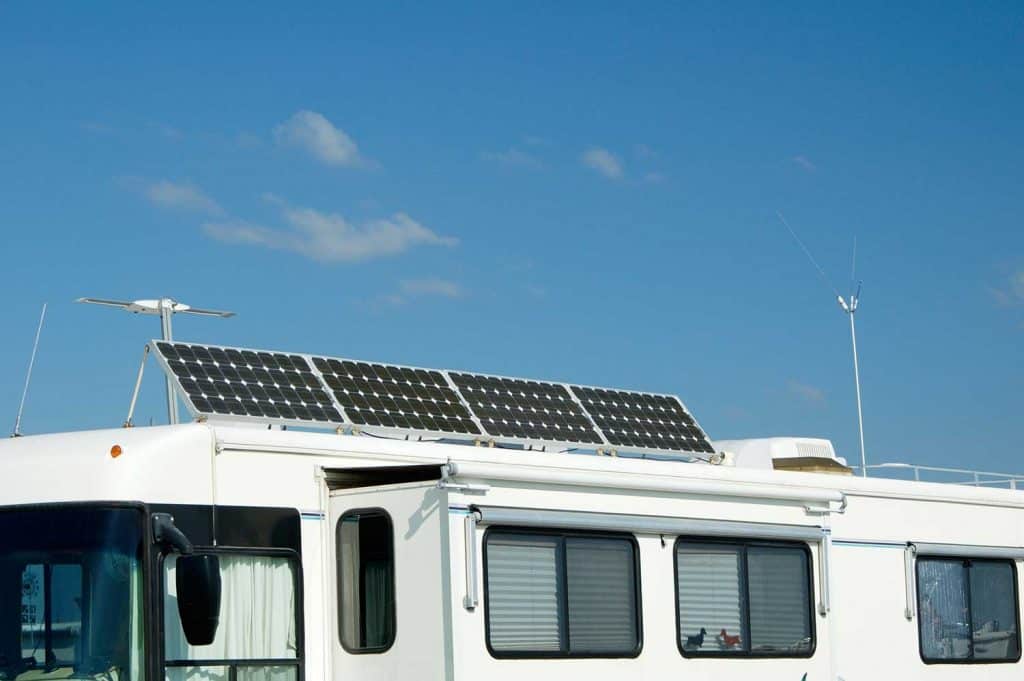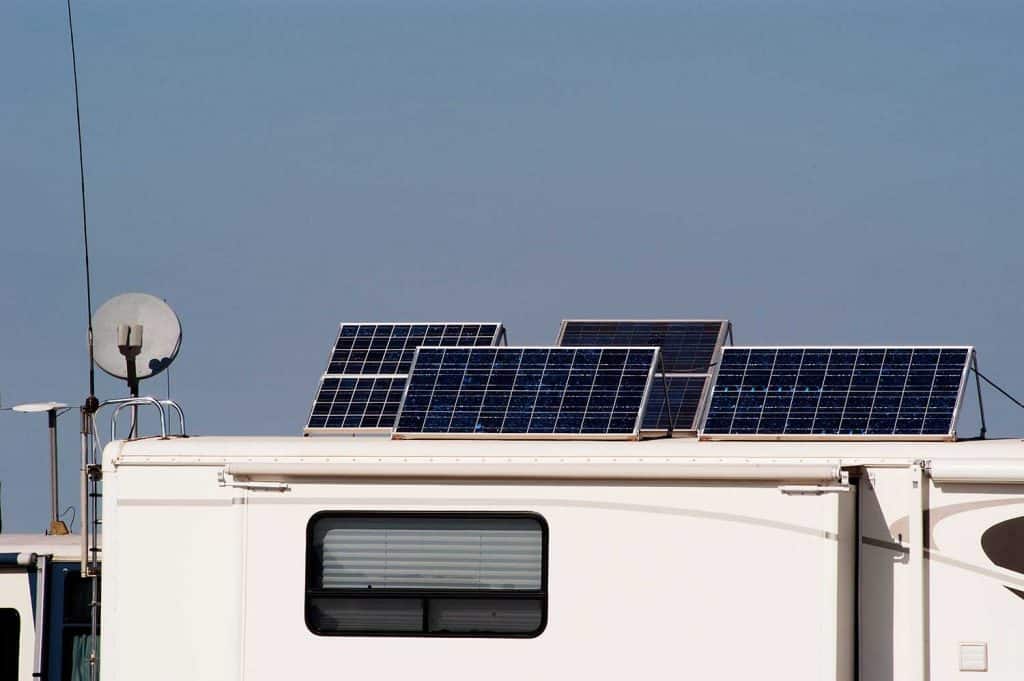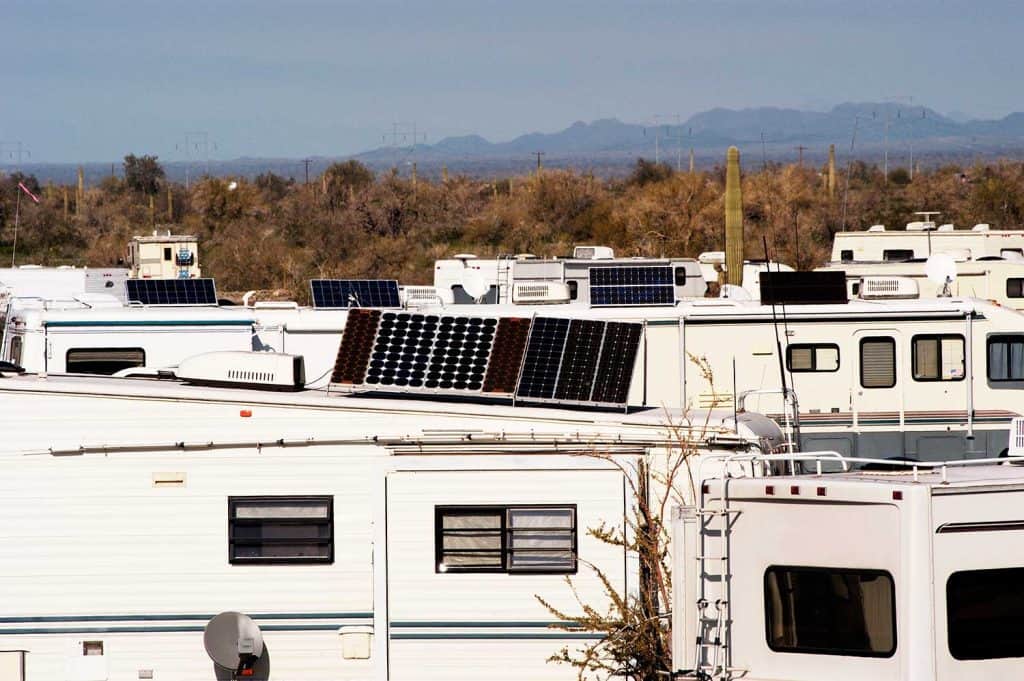 Solar panels are quickly becoming a must-have accessory for RV owners, but finding the best solar setup for your rig can get extremely confusing. For anyone unfamiliar with electric terminology, this topic can seem impenetrable at first, but take our word for it, after you start getting familiar with the basics of RV solar, it really is doable. We have done extensive research and pulled information from some of the best sources on the internet. So, what's the answer?
Solar panels are quickly becoming a must-have accessory for RV owners, but finding the best solar setup for your rig can get extremely confusing. For anyone unfamiliar with electric terminology, this topic can seem impenetrable at first, but take our word for it, after you start getting familiar with the basics of RV solar, it really is doable. We have done extensive research and pulled information from some of the best sources on the internet. So, what's the answer?
Unfortunately, there is no "one-size-fits-all" answer to the question of the size of solar panels on an RV. First, there is a huge range of RV sizes out there - from the diesel pusher motorhomes to the tiny teardrop campers that can be towed by a Honda Civic.
To find your ideal solar setup, you must first calculate your power needs, and then find a solar setup that meets those needs. Once you know how many amp-hours your RV uses per day, you can assume that every 100 watts of solar panel capacity will provide 30 amp-hours of power per day.
Read more: 7 Types of RVs You Simply Must Know
Okay, so you probably need some more information. Most people don't already know how many amp-hours of power their RV uses. Keep reading as we take a deep dive into the calculations needed to find the perfect solar setup.
Calculating the Power You Need for Your RV

Let's face it: it can be difficult to estimate your power needs. Even knowing the size and type of RV doesn't really help us much. That's because two identical 40-foot 5th wheels may have wildly different power needs, depending on how many gadgets you have plugged in, what the weather is like, etc.
Luckily, there are several methods you can use to get a good idea of how much power you need. Here are the two best ways to get a good estimate of your power needs:
Use an Online Calculator
First, you can use one of these handy online calculator tools. Unfortunately, these tools will require a lot of information that can be hard to come by. For example, you will be asked how long you use every single powered item in your RV each day, from lights to outlets to appliances.
Most RV owners find these questions very hard to answer because this is not something you normally keep track of, and the answers will often change each camping trip. As you fill it out, just do your best to provide accurate answers for each item on the calculator.
Naturally, these calculations involve making a lot of educated guesses, so your results will, therefore, be imprecise. Still, this can be a good way to find a ballpark figure.
Do a Real-World Test in your RV
If you would like a more accurate picture of your power needs, you can find out by simply going camping. As you can, you can track your battery use by watching how quickly your battery is depleted.
First, however, you will need to find out how many amp-hours your battery bank holds. If you don't already know, go take a look at your batteries. The amp-hours should be listed, probably as "AH," somewhere on the battery.
Once you find your battery capacity, it's time to go camping. Start out with a 100% charged battery - either run the generator or plug it in until you are ready to start the test. Once you begin the test, it is important to use your RV normally. Don't do anything special to preserve or deplete the batteries. We are trying to find out how much power your RV will use on future camping trips.
If you have lead-acid batteries, make sure to stop the test and charge them up before they get too low on juice. Going too low can damage them permanently. We suggest stopping the test when your batteries hit 50%, but the calculation will work no matter where you end the test.
Okay, on to the calculation. For math's sake, let's assume your battery bank is 100 amp-hours (it is probably more than that). Say you camp for two full days before your battery bank hits the 50% mark. To find your usage, simply multiply your amp-hours (100) by your usage (.5 in this case because we used half of the battery capacity).
This gives us a figure of 50 amp-hours or 25 amp-hours per day. Next, we need to find a solar setup that will meet that need.
How Many Solar Panels Do I Need to Run an RV?

Once you understand how much power your RV uses, you can start shopping for solar panels. As you shop, you will find that all solar panels are given a wattage rating. Some panels make more power than others. So, you can think of this question as "how many watts do I need?" rather than simply how many panels you need.
Now, some RV owners may prefer two smaller panels or one larger one, but that's up to your preference. If you are going to mount the panel to the roof and don't need to move it often, perhaps fewer, larger panels will work best. However, if you plan on setting the panels up manually at each campsite, smaller ones will be easier on your back.
What Size 12v Solar Panel Do I Need?
Okay, so at this point, you have determined how many amp-hours your RV uses each day. But how does that translate to those watt ratings?
Your Results May Vary
Because your solar panel's output will depend on how much sun your panels see and how directly that light hits them, there is no easy answer to this question. For example, Arizona campers can expect to get a lot more out of their panels than the average Pacific Northwest camper, simply because they receive so much more sunlight.
How you have your panels positioned and how clean you keep them can also affect your power generation. That's because solar panels are quite sensitive. Even a light layer of dust can quickly erode your power figures, so you can imagine how important it is to keep them clean and angled directly at the sun for the best results.
A Good Estimate
Okay, so we have that disclaimer out of the way, we need to move forward with some sort of figure. A good estimate most manufacturers give is that you can expect to generate 30 amp-hours per day from every 100 watts of panels. Let's go with that.
So, if we go back to our example from above, we calculated that the RV uses 25 amp-hours per day. That means that one 100-watt panel should be just about perfect. And this is a common solar panel size - click here to check out one of the best 100-watt solar panels on Amazon, if this is the right size for you.
It's a good idea to err on the side of having a little too much power rather than not enough when purchasing a solar set up. The thought process behind this approach is that you'll hopefully be able to make up any lost ground lost to cloudy days or shady campsites.
But, if you prefer, you can start off small and then add more panels if you find that your initial setup isn't cutting it. Again, just make sure you don't deplete your lead-acid batteries too much as this drastically reduce their ability to hold a charge. For more information about RV batteries, see our excellent article on the topic.
Soak up Those Rays!

Once you make the transition to solar power, we think you will be one happy camper! It can be quite liberating to no longer have to rely on generators and shore power to run your RV. Once your setup is working, you can boondock for longer and lower your energy bills. After that upfront cost, this really is a situation with little to no drawbacks.
Learn more about the electric systems in your RV
There's more to providing power to your RV than just solar panels, right? We thought you'd be interested in these posts as well -
Boondocking: How to get electricity to your RV without hookups
What is the Best Generator for a Travel Trailer?

